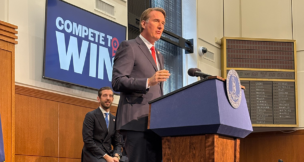Northam proposes $2.1B in tax cuts for ‘working people’
Exiting governor calls for eliminating grocery levy, providing income tax rebate
Kate Andrews //December 14, 2021//
Northam proposes $2.1B in tax cuts for ‘working people’
Exiting governor calls for eliminating grocery levy, providing income tax rebate
Kate Andrews //December 14, 2021//
Virginia Gov. Ralph Northam, who leaves office next month, proposed four tax cuts Tuesday, including eliminating Virginia’s 1.5% sales tax on groceries and providing an income tax cut for low- and middle-income Virginians.
He also proposed one-time tax rebates — $250 for individuals and $500 for married couples — and ending “accelerated sales tax” payments by retailers. Virginia code requires that the outgoing governor create a budget for the following year, even though his successor may have vastly different priorities, but Northam’s proposals are similar to those recommended by Virginia Gov.-elect Glenn Youngkin, who campaigned on a promise to end the state’s grocery tax and make other cuts. Youngkin takes office Jan. 15, 2022.
According to Northam’s announcement, the four tax policy changes would reduce state revenues by $2.1 billion, with most of the amount a one-time reduction for the state’s General Fund, and $419 million in ongoing obligations. The budget also would put $1.7 billion into the Revenue Stabilization Fund, set aside $1 billion for the Virginia Retirement System and allocate $2.8 billion for capital projects in state government and higher education buildings.
“When Virginia cuts taxes next year, it should be done in a way that benefits working people,” Northam said in a statement. “Many professionals made it through the pandemic fine, as their work simply moved online. But workers haven’t been so lucky when their jobs require close contact with other people. Some jobs simply can’t move online — restaurant workers, early childhood educators, home care attendants and others — and we all depend on the people who do this work. Virginia can help working people by eliminating the state grocery tax, providing one-time rebates, and giving a tax break to people who are working.”
Under Northam’s budget, the state would end the sales tax on groceries, which is the case in many states and, according to the governor’s office, would not affect local tax revenues. Also, Northam proposed making up to 15% of the federal earned income tax credit (EITC) refundable for eligible low- and middle-income residents, which depends on income level, marital status and family size. The $250 and $500 one-time tax rebates would be available to anyone who files state income taxes. Finally, retail sales tax payments — which are required to be paid before retailers collect revenues, in response to the 2008 Great Recession — would no longer be charged early.
Northam, who has been traveling the state in a farewell “Thank You, Virginia” tour, noted that Virginia ended the 2021 fiscal year with a record surplus of $2.6 billion. Under Northam’s proposed budget, the state would have $3.8 billion in financial reserves.
Youngkin, the first Republican elected as Virginia’s governor since Bob McDonnell in 2009, said this month at the Virginia Economic Summit & Forum on Trade that he would double the state’s standard tax deduction, provide a one-time tax rebate, eliminate the grocery tax and suspend for one year the most recent increase in the state’s gas tax.
o
















